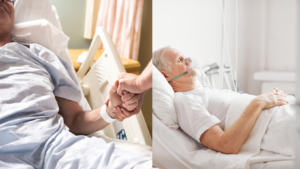Anointing of the Sick.
Pastoral Care and the Sacrament of the Anointing of the Sick
The sacrament in which the sick are anointed with holy oil was, until recent years,
called Extreme Unction. That it is now called the Sacrament of the Sick signifies a big
change in understanding and practice.
“Every priest, but only a priest, can validly administer the anointing of the
sick”.(Canon 1003#1) If a sickness grows worse, or is on going, family, friends and
those who care for the sick, have the responsibility to inform the pastor, and help
prepare the sick person for the reception of the Sacrament of Anointing of the Sick. In
the celebration of the sacrament we convey HOPE: God is always the healer, and we
are open to the possibility of a miracle. It may be pastorally appropriate to invite all
who need healing, whether they are suffering severely or slightly to the comfort of the
sacrament.
The celebration of the Sacrament of Anointing of the Sick can become an occasion to
encourage family participation. There is a need to deepen people’s understanding of the
Sacrament as “healing” and strengthening. For some it is still a cause for fear.
By the Sacrament of Anointing of the Sick the Church commends those who are ill to
the suffering of the glorified Lord, that he may raise them up and save them. The
sacrament is a personal encounter of the sick person with our loving, healing God, but
it is also a sacrament of community.
Like all sacraments, the Anointing of the Sick is a liturgical and communal celebration,
whether it takes place in the family home, a hospital or a church for a single person or a
whole group of sick persons. God offers the anointed person the grace to be healed and
comforted, to overcome anxiety and despair and to be made whole. It is an affirmation
for Christians that they are supported in their suffering, and that there are others who
care about them in their time of need.
Keep in mind the following:
The Sacrament of Anointing is for ‘Healing’ and not for persons who are
‘Dying’.
Send a person to call a priest. No sick call on telephone will be entertained.
Inform the priest if the sick is able to receive the communion or not.
Do not force the sick person to make his/her confession.
lf in hospital, call the priest from the church closest to the hospital or nursing
home.

